Developing Manager Report: Comparing Leadership Styles in Hospitality
VerifiedAdded on 2020/10/23
|27
|6677
|440
Report
AI Summary
This report delves into the concept of a developing manager, focusing on skill improvement and its impact on organizational success. It begins by comparing the management styles, leadership characteristics, and organizational cultures of Radisson Blu and Marriott, highlighting the use of autocratic versus democratic leadership and contrasting classical and bureaucratic management theories. The report then shifts to a self-assessment of management skills, including planning, communication, decision-making, and delegation. It analyzes personal strengths, weaknesses, opportunities, and threats (SWOT), and sets objectives for career development. Furthermore, the report examines how to lead and motivate teams to achieve organizational goals, including managerial decisions and recommendations for improvement. Finally, it discusses the role of managerial and personal skills in career development, providing a detailed development plan and addressing performance management and reward systems. The report concludes by summarizing the key findings and insights gained from the analysis.
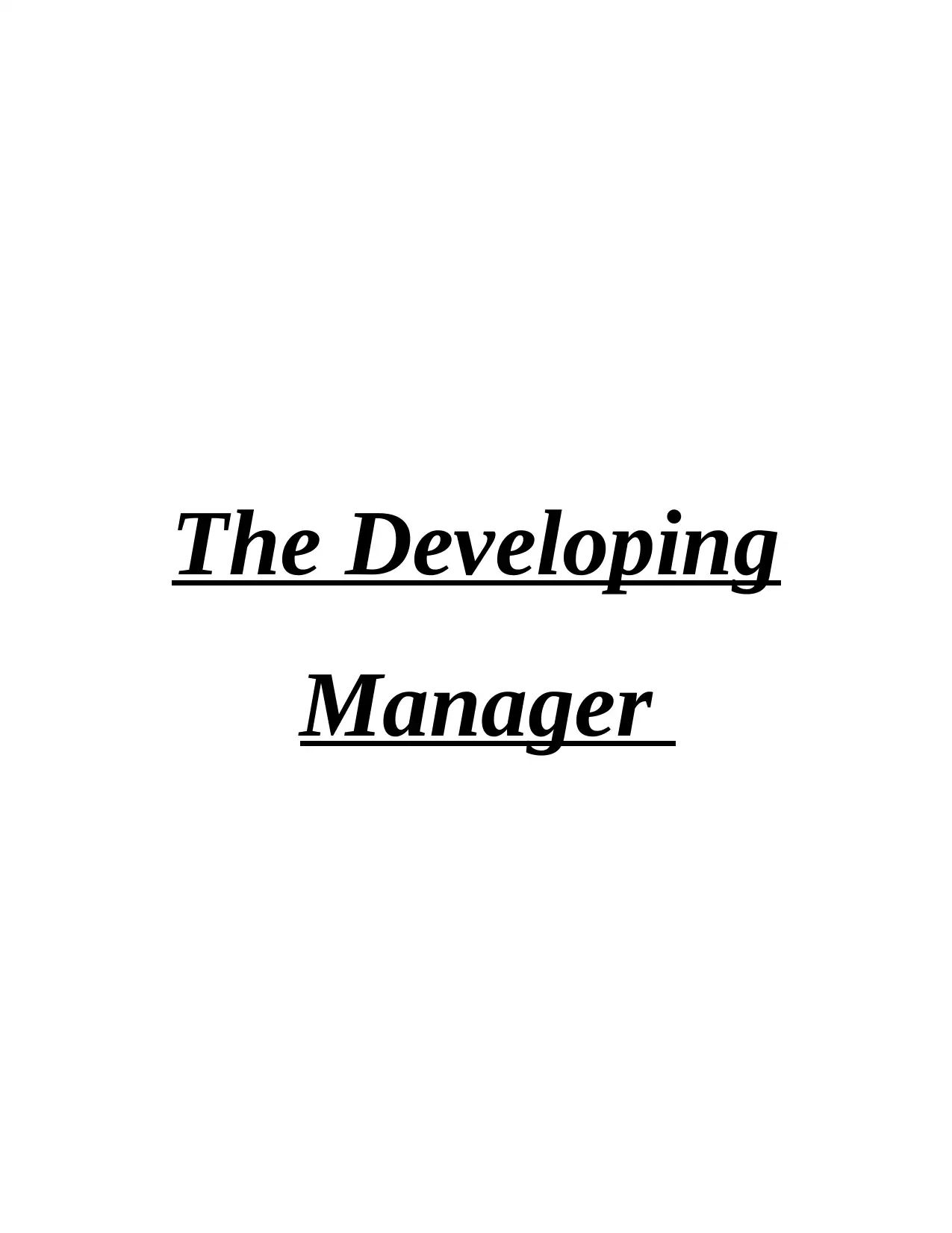
The Developing
Manager
Manager
Paraphrase This Document
Need a fresh take? Get an instant paraphrase of this document with our AI Paraphraser
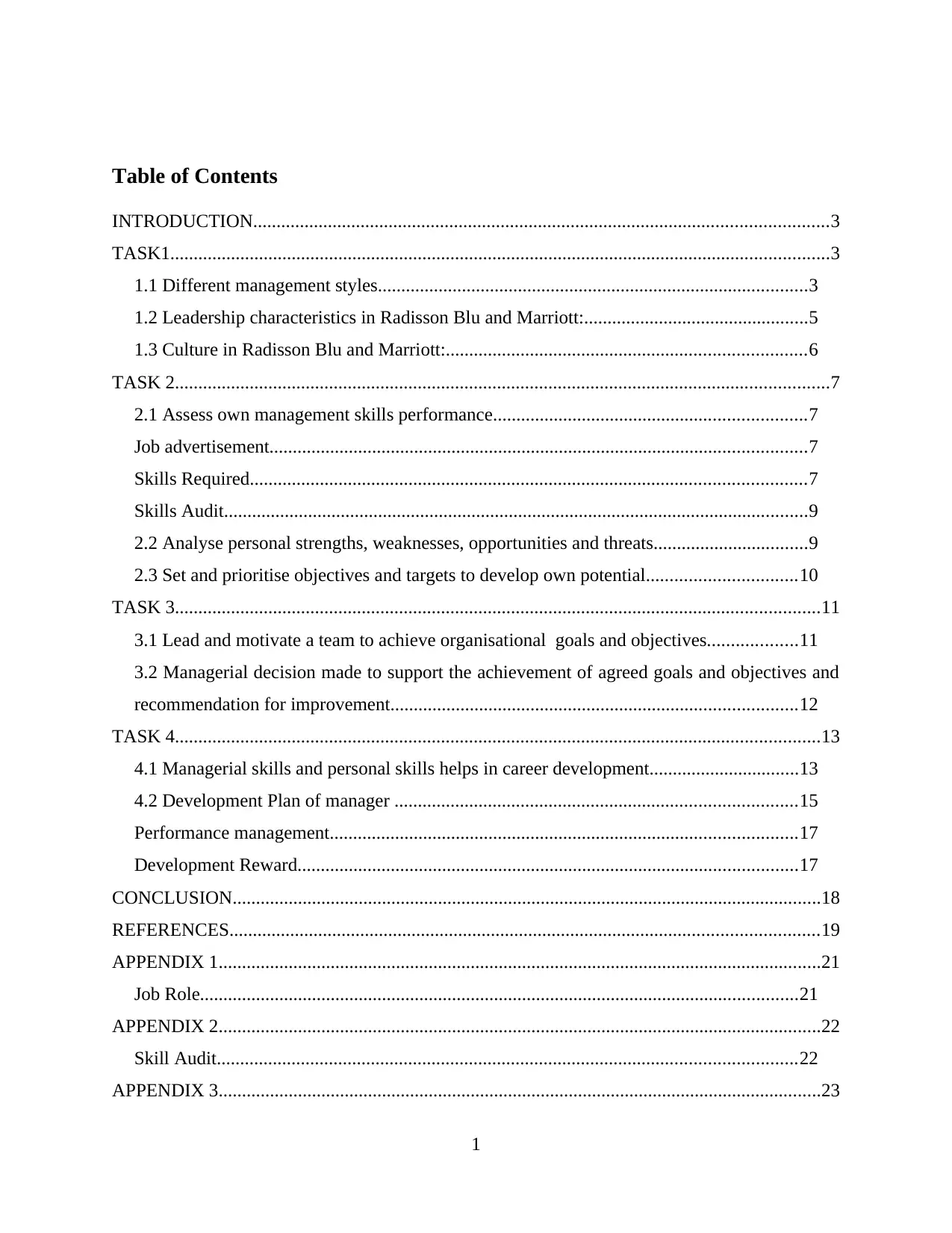
Table of Contents
INTRODUCTION...........................................................................................................................3
TASK1.............................................................................................................................................3
1.1 Different management styles............................................................................................3
1.2 Leadership characteristics in Radisson Blu and Marriott:................................................5
1.3 Culture in Radisson Blu and Marriott:.............................................................................6
TASK 2............................................................................................................................................7
2.1 Assess own management skills performance...................................................................7
Job advertisement...................................................................................................................7
Skills Required.......................................................................................................................7
Skills Audit.............................................................................................................................9
2.2 Analyse personal strengths, weaknesses, opportunities and threats.................................9
2.3 Set and prioritise objectives and targets to develop own potential................................10
TASK 3..........................................................................................................................................11
3.1 Lead and motivate a team to achieve organisational goals and objectives...................11
3.2 Managerial decision made to support the achievement of agreed goals and objectives and
recommendation for improvement.......................................................................................12
TASK 4..........................................................................................................................................13
4.1 Managerial skills and personal skills helps in career development................................13
4.2 Development Plan of manager ......................................................................................15
Performance management....................................................................................................17
Development Reward...........................................................................................................17
CONCLUSION..............................................................................................................................18
REFERENCES..............................................................................................................................19
APPENDIX 1.................................................................................................................................21
Job Role................................................................................................................................21
APPENDIX 2.................................................................................................................................22
Skill Audit............................................................................................................................22
APPENDIX 3.................................................................................................................................23
1
INTRODUCTION...........................................................................................................................3
TASK1.............................................................................................................................................3
1.1 Different management styles............................................................................................3
1.2 Leadership characteristics in Radisson Blu and Marriott:................................................5
1.3 Culture in Radisson Blu and Marriott:.............................................................................6
TASK 2............................................................................................................................................7
2.1 Assess own management skills performance...................................................................7
Job advertisement...................................................................................................................7
Skills Required.......................................................................................................................7
Skills Audit.............................................................................................................................9
2.2 Analyse personal strengths, weaknesses, opportunities and threats.................................9
2.3 Set and prioritise objectives and targets to develop own potential................................10
TASK 3..........................................................................................................................................11
3.1 Lead and motivate a team to achieve organisational goals and objectives...................11
3.2 Managerial decision made to support the achievement of agreed goals and objectives and
recommendation for improvement.......................................................................................12
TASK 4..........................................................................................................................................13
4.1 Managerial skills and personal skills helps in career development................................13
4.2 Development Plan of manager ......................................................................................15
Performance management....................................................................................................17
Development Reward...........................................................................................................17
CONCLUSION..............................................................................................................................18
REFERENCES..............................................................................................................................19
APPENDIX 1.................................................................................................................................21
Job Role................................................................................................................................21
APPENDIX 2.................................................................................................................................22
Skill Audit............................................................................................................................22
APPENDIX 3.................................................................................................................................23
1
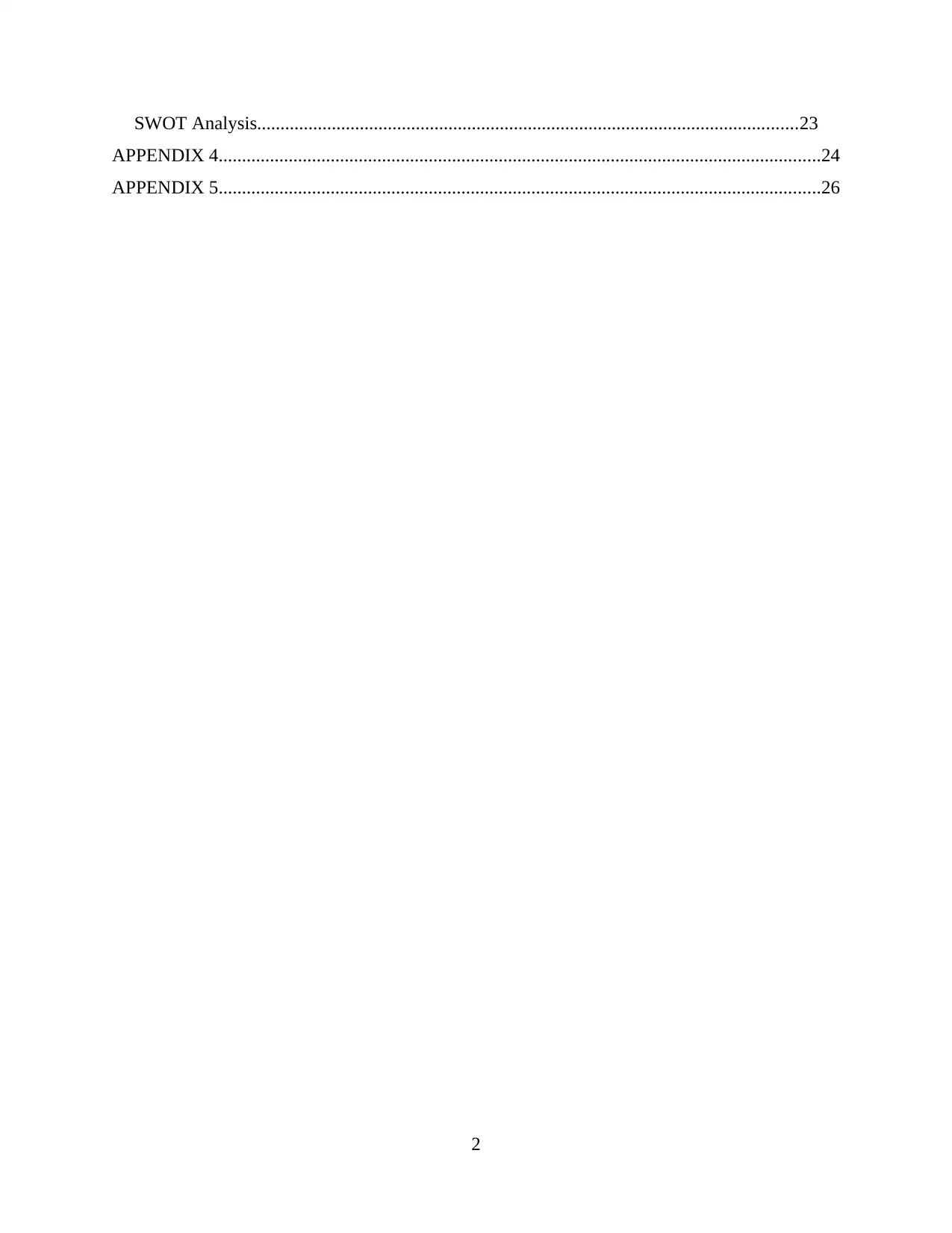
SWOT Analysis....................................................................................................................23
APPENDIX 4.................................................................................................................................24
APPENDIX 5.................................................................................................................................26
2
APPENDIX 4.................................................................................................................................24
APPENDIX 5.................................................................................................................................26
2
⊘ This is a preview!⊘
Do you want full access?
Subscribe today to unlock all pages.

Trusted by 1+ million students worldwide
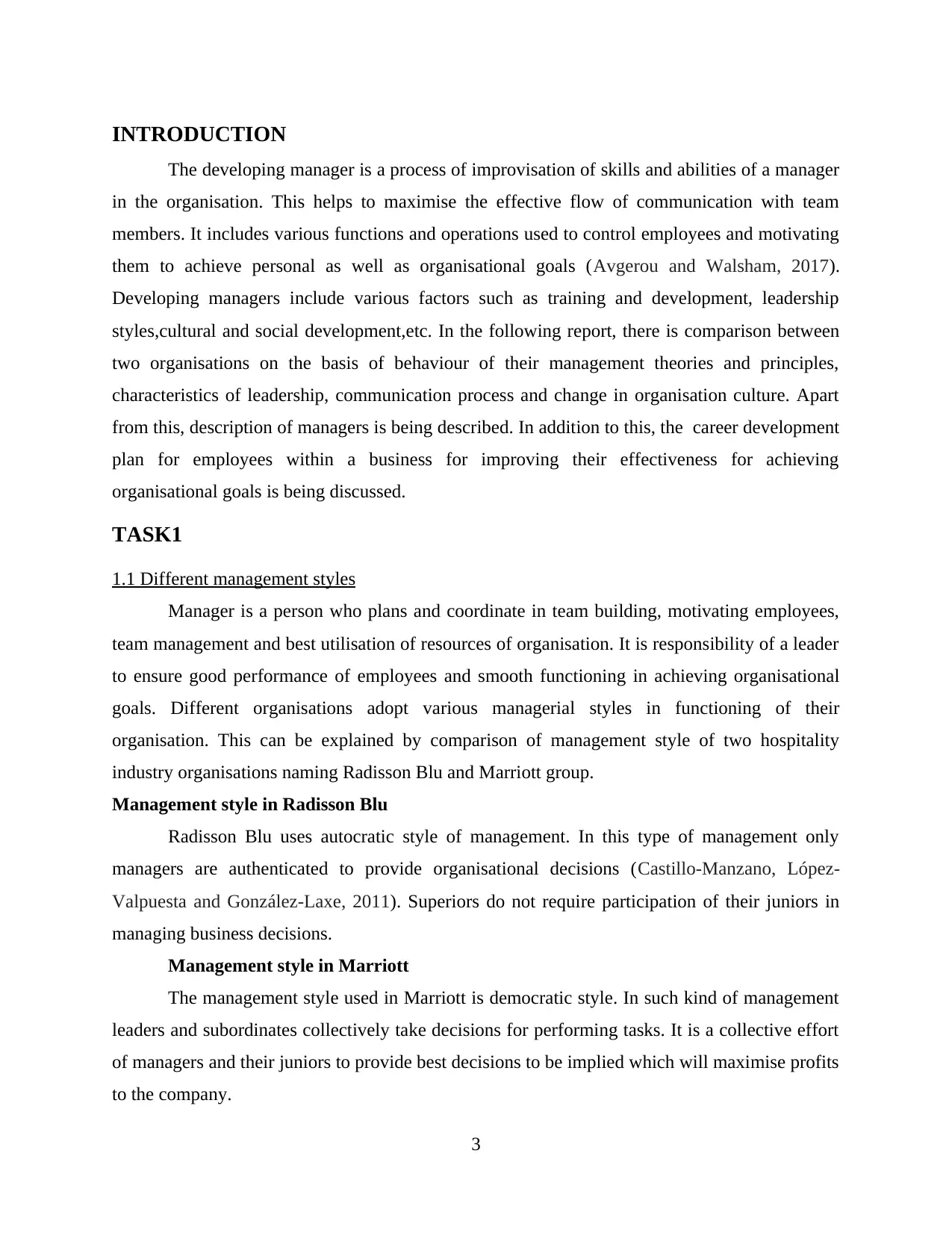
INTRODUCTION
The developing manager is a process of improvisation of skills and abilities of a manager
in the organisation. This helps to maximise the effective flow of communication with team
members. It includes various functions and operations used to control employees and motivating
them to achieve personal as well as organisational goals (Avgerou and Walsham, 2017).
Developing managers include various factors such as training and development, leadership
styles,cultural and social development,etc. In the following report, there is comparison between
two organisations on the basis of behaviour of their management theories and principles,
characteristics of leadership, communication process and change in organisation culture. Apart
from this, description of managers is being described. In addition to this, the career development
plan for employees within a business for improving their effectiveness for achieving
organisational goals is being discussed.
TASK1
1.1 Different management styles
Manager is a person who plans and coordinate in team building, motivating employees,
team management and best utilisation of resources of organisation. It is responsibility of a leader
to ensure good performance of employees and smooth functioning in achieving organisational
goals. Different organisations adopt various managerial styles in functioning of their
organisation. This can be explained by comparison of management style of two hospitality
industry organisations naming Radisson Blu and Marriott group.
Management style in Radisson Blu
Radisson Blu uses autocratic style of management. In this type of management only
managers are authenticated to provide organisational decisions (Castillo-Manzano, López-
Valpuesta and González-Laxe, 2011). Superiors do not require participation of their juniors in
managing business decisions.
Management style in Marriott
The management style used in Marriott is democratic style. In such kind of management
leaders and subordinates collectively take decisions for performing tasks. It is a collective effort
of managers and their juniors to provide best decisions to be implied which will maximise profits
to the company.
3
The developing manager is a process of improvisation of skills and abilities of a manager
in the organisation. This helps to maximise the effective flow of communication with team
members. It includes various functions and operations used to control employees and motivating
them to achieve personal as well as organisational goals (Avgerou and Walsham, 2017).
Developing managers include various factors such as training and development, leadership
styles,cultural and social development,etc. In the following report, there is comparison between
two organisations on the basis of behaviour of their management theories and principles,
characteristics of leadership, communication process and change in organisation culture. Apart
from this, description of managers is being described. In addition to this, the career development
plan for employees within a business for improving their effectiveness for achieving
organisational goals is being discussed.
TASK1
1.1 Different management styles
Manager is a person who plans and coordinate in team building, motivating employees,
team management and best utilisation of resources of organisation. It is responsibility of a leader
to ensure good performance of employees and smooth functioning in achieving organisational
goals. Different organisations adopt various managerial styles in functioning of their
organisation. This can be explained by comparison of management style of two hospitality
industry organisations naming Radisson Blu and Marriott group.
Management style in Radisson Blu
Radisson Blu uses autocratic style of management. In this type of management only
managers are authenticated to provide organisational decisions (Castillo-Manzano, López-
Valpuesta and González-Laxe, 2011). Superiors do not require participation of their juniors in
managing business decisions.
Management style in Marriott
The management style used in Marriott is democratic style. In such kind of management
leaders and subordinates collectively take decisions for performing tasks. It is a collective effort
of managers and their juniors to provide best decisions to be implied which will maximise profits
to the company.
3
Paraphrase This Document
Need a fresh take? Get an instant paraphrase of this document with our AI Paraphraser
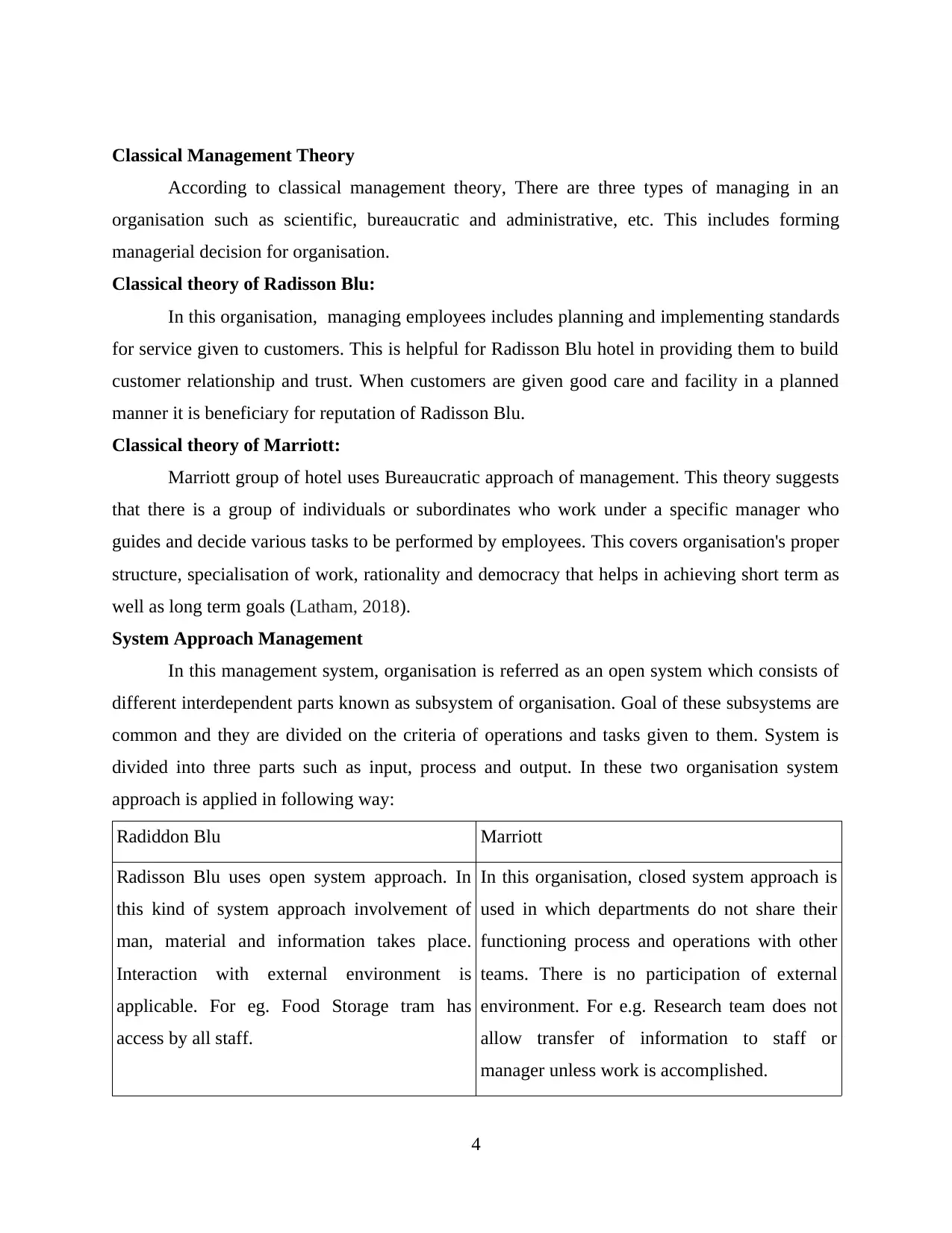
Classical Management Theory
According to classical management theory, There are three types of managing in an
organisation such as scientific, bureaucratic and administrative, etc. This includes forming
managerial decision for organisation.
Classical theory of Radisson Blu:
In this organisation, managing employees includes planning and implementing standards
for service given to customers. This is helpful for Radisson Blu hotel in providing them to build
customer relationship and trust. When customers are given good care and facility in a planned
manner it is beneficiary for reputation of Radisson Blu.
Classical theory of Marriott:
Marriott group of hotel uses Bureaucratic approach of management. This theory suggests
that there is a group of individuals or subordinates who work under a specific manager who
guides and decide various tasks to be performed by employees. This covers organisation's proper
structure, specialisation of work, rationality and democracy that helps in achieving short term as
well as long term goals (Latham, 2018).
System Approach Management
In this management system, organisation is referred as an open system which consists of
different interdependent parts known as subsystem of organisation. Goal of these subsystems are
common and they are divided on the criteria of operations and tasks given to them. System is
divided into three parts such as input, process and output. In these two organisation system
approach is applied in following way:
Radiddon Blu Marriott
Radisson Blu uses open system approach. In
this kind of system approach involvement of
man, material and information takes place.
Interaction with external environment is
applicable. For eg. Food Storage tram has
access by all staff.
In this organisation, closed system approach is
used in which departments do not share their
functioning process and operations with other
teams. There is no participation of external
environment. For e.g. Research team does not
allow transfer of information to staff or
manager unless work is accomplished.
4
According to classical management theory, There are three types of managing in an
organisation such as scientific, bureaucratic and administrative, etc. This includes forming
managerial decision for organisation.
Classical theory of Radisson Blu:
In this organisation, managing employees includes planning and implementing standards
for service given to customers. This is helpful for Radisson Blu hotel in providing them to build
customer relationship and trust. When customers are given good care and facility in a planned
manner it is beneficiary for reputation of Radisson Blu.
Classical theory of Marriott:
Marriott group of hotel uses Bureaucratic approach of management. This theory suggests
that there is a group of individuals or subordinates who work under a specific manager who
guides and decide various tasks to be performed by employees. This covers organisation's proper
structure, specialisation of work, rationality and democracy that helps in achieving short term as
well as long term goals (Latham, 2018).
System Approach Management
In this management system, organisation is referred as an open system which consists of
different interdependent parts known as subsystem of organisation. Goal of these subsystems are
common and they are divided on the criteria of operations and tasks given to them. System is
divided into three parts such as input, process and output. In these two organisation system
approach is applied in following way:
Radiddon Blu Marriott
Radisson Blu uses open system approach. In
this kind of system approach involvement of
man, material and information takes place.
Interaction with external environment is
applicable. For eg. Food Storage tram has
access by all staff.
In this organisation, closed system approach is
used in which departments do not share their
functioning process and operations with other
teams. There is no participation of external
environment. For e.g. Research team does not
allow transfer of information to staff or
manager unless work is accomplished.
4
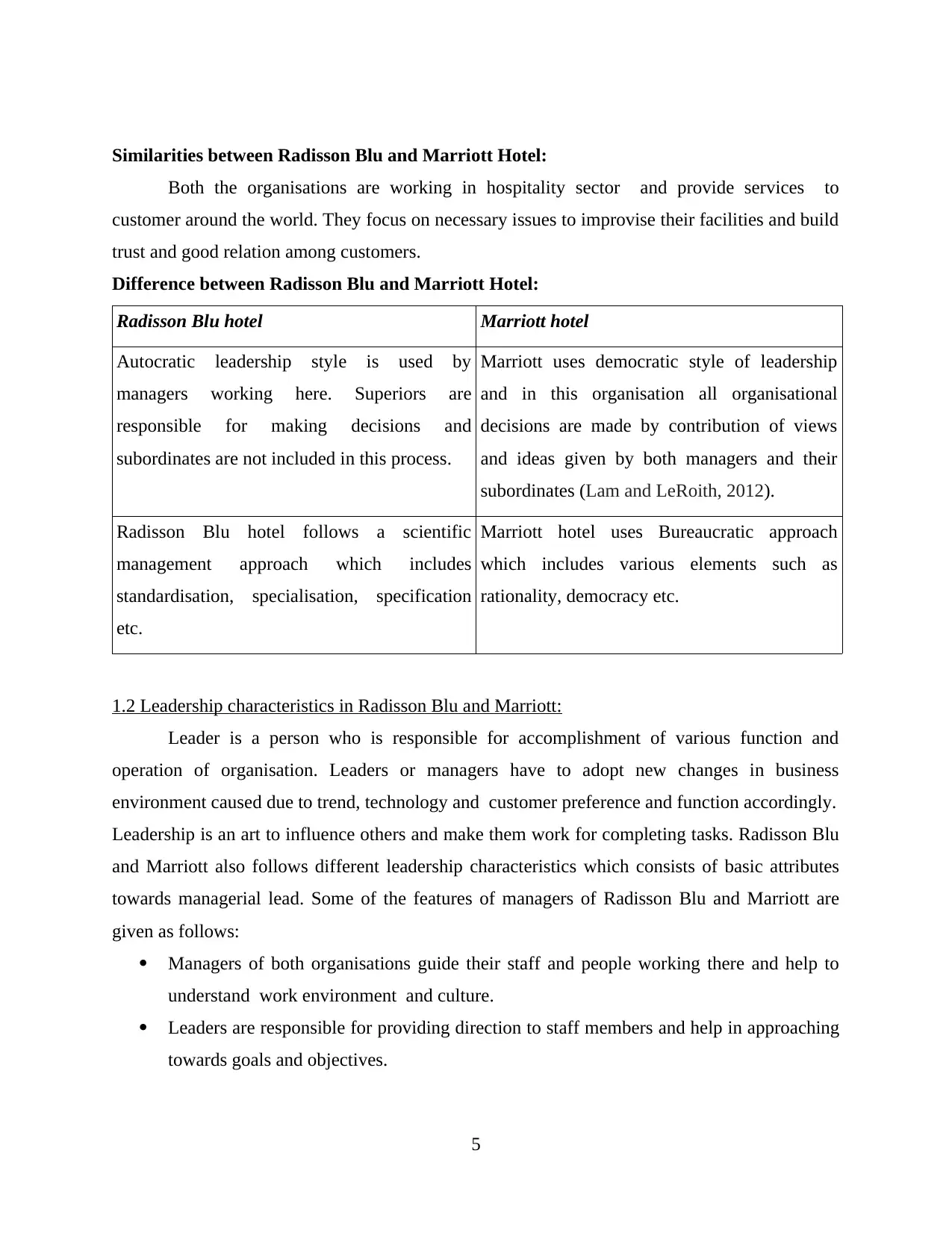
Similarities between Radisson Blu and Marriott Hotel:
Both the organisations are working in hospitality sector and provide services to
customer around the world. They focus on necessary issues to improvise their facilities and build
trust and good relation among customers.
Difference between Radisson Blu and Marriott Hotel:
Radisson Blu hotel Marriott hotel
Autocratic leadership style is used by
managers working here. Superiors are
responsible for making decisions and
subordinates are not included in this process.
Marriott uses democratic style of leadership
and in this organisation all organisational
decisions are made by contribution of views
and ideas given by both managers and their
subordinates (Lam and LeRoith, 2012).
Radisson Blu hotel follows a scientific
management approach which includes
standardisation, specialisation, specification
etc.
Marriott hotel uses Bureaucratic approach
which includes various elements such as
rationality, democracy etc.
1.2 Leadership characteristics in Radisson Blu and Marriott:
Leader is a person who is responsible for accomplishment of various function and
operation of organisation. Leaders or managers have to adopt new changes in business
environment caused due to trend, technology and customer preference and function accordingly.
Leadership is an art to influence others and make them work for completing tasks. Radisson Blu
and Marriott also follows different leadership characteristics which consists of basic attributes
towards managerial lead. Some of the features of managers of Radisson Blu and Marriott are
given as follows:
Managers of both organisations guide their staff and people working there and help to
understand work environment and culture.
Leaders are responsible for providing direction to staff members and help in approaching
towards goals and objectives.
5
Both the organisations are working in hospitality sector and provide services to
customer around the world. They focus on necessary issues to improvise their facilities and build
trust and good relation among customers.
Difference between Radisson Blu and Marriott Hotel:
Radisson Blu hotel Marriott hotel
Autocratic leadership style is used by
managers working here. Superiors are
responsible for making decisions and
subordinates are not included in this process.
Marriott uses democratic style of leadership
and in this organisation all organisational
decisions are made by contribution of views
and ideas given by both managers and their
subordinates (Lam and LeRoith, 2012).
Radisson Blu hotel follows a scientific
management approach which includes
standardisation, specialisation, specification
etc.
Marriott hotel uses Bureaucratic approach
which includes various elements such as
rationality, democracy etc.
1.2 Leadership characteristics in Radisson Blu and Marriott:
Leader is a person who is responsible for accomplishment of various function and
operation of organisation. Leaders or managers have to adopt new changes in business
environment caused due to trend, technology and customer preference and function accordingly.
Leadership is an art to influence others and make them work for completing tasks. Radisson Blu
and Marriott also follows different leadership characteristics which consists of basic attributes
towards managerial lead. Some of the features of managers of Radisson Blu and Marriott are
given as follows:
Managers of both organisations guide their staff and people working there and help to
understand work environment and culture.
Leaders are responsible for providing direction to staff members and help in approaching
towards goals and objectives.
5
⊘ This is a preview!⊘
Do you want full access?
Subscribe today to unlock all pages.

Trusted by 1+ million students worldwide
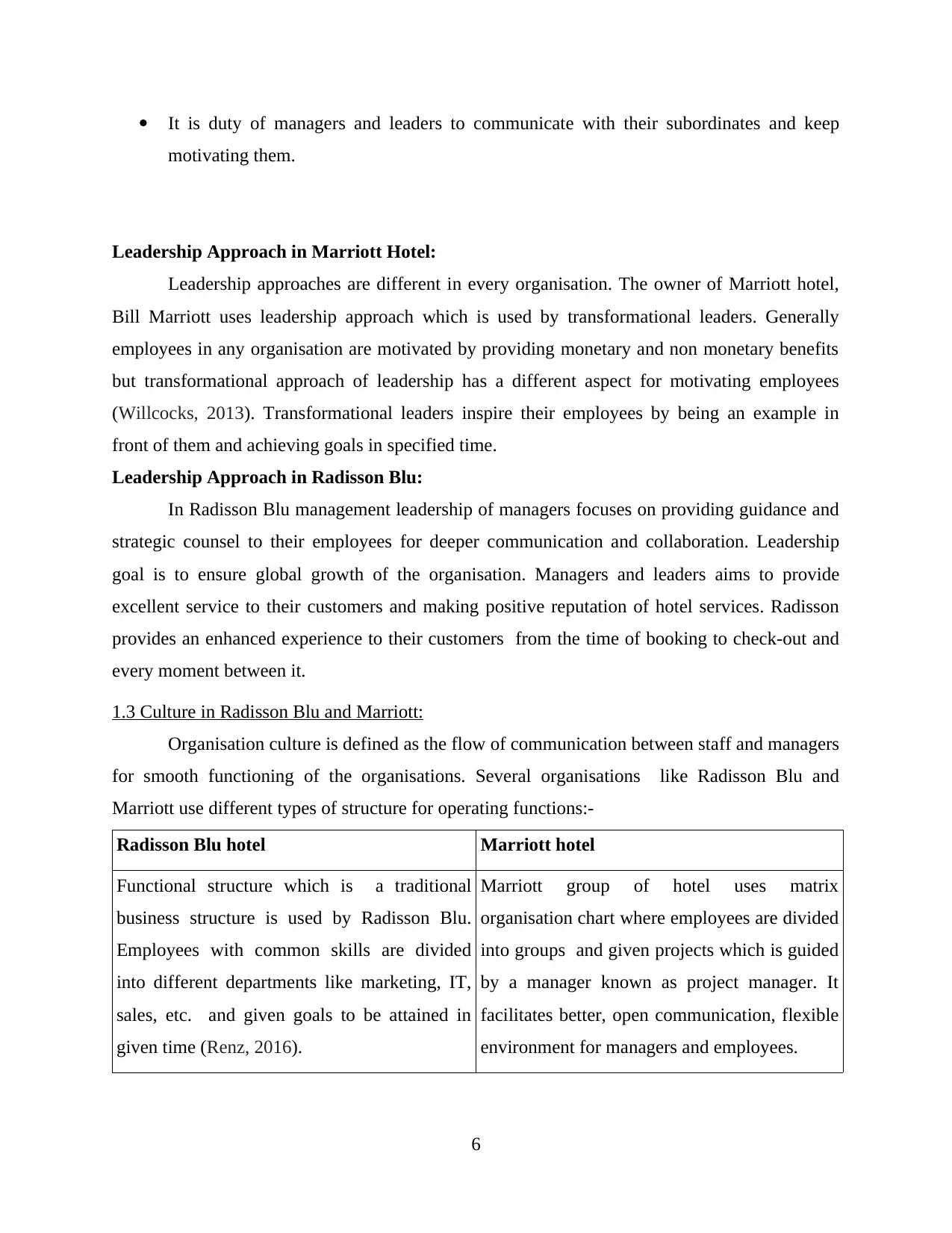
It is duty of managers and leaders to communicate with their subordinates and keep
motivating them.
Leadership Approach in Marriott Hotel:
Leadership approaches are different in every organisation. The owner of Marriott hotel,
Bill Marriott uses leadership approach which is used by transformational leaders. Generally
employees in any organisation are motivated by providing monetary and non monetary benefits
but transformational approach of leadership has a different aspect for motivating employees
(Willcocks, 2013). Transformational leaders inspire their employees by being an example in
front of them and achieving goals in specified time.
Leadership Approach in Radisson Blu:
In Radisson Blu management leadership of managers focuses on providing guidance and
strategic counsel to their employees for deeper communication and collaboration. Leadership
goal is to ensure global growth of the organisation. Managers and leaders aims to provide
excellent service to their customers and making positive reputation of hotel services. Radisson
provides an enhanced experience to their customers from the time of booking to check-out and
every moment between it.
1.3 Culture in Radisson Blu and Marriott:
Organisation culture is defined as the flow of communication between staff and managers
for smooth functioning of the organisations. Several organisations like Radisson Blu and
Marriott use different types of structure for operating functions:-
Radisson Blu hotel Marriott hotel
Functional structure which is a traditional
business structure is used by Radisson Blu.
Employees with common skills are divided
into different departments like marketing, IT,
sales, etc. and given goals to be attained in
given time (Renz, 2016).
Marriott group of hotel uses matrix
organisation chart where employees are divided
into groups and given projects which is guided
by a manager known as project manager. It
facilitates better, open communication, flexible
environment for managers and employees.
6
motivating them.
Leadership Approach in Marriott Hotel:
Leadership approaches are different in every organisation. The owner of Marriott hotel,
Bill Marriott uses leadership approach which is used by transformational leaders. Generally
employees in any organisation are motivated by providing monetary and non monetary benefits
but transformational approach of leadership has a different aspect for motivating employees
(Willcocks, 2013). Transformational leaders inspire their employees by being an example in
front of them and achieving goals in specified time.
Leadership Approach in Radisson Blu:
In Radisson Blu management leadership of managers focuses on providing guidance and
strategic counsel to their employees for deeper communication and collaboration. Leadership
goal is to ensure global growth of the organisation. Managers and leaders aims to provide
excellent service to their customers and making positive reputation of hotel services. Radisson
provides an enhanced experience to their customers from the time of booking to check-out and
every moment between it.
1.3 Culture in Radisson Blu and Marriott:
Organisation culture is defined as the flow of communication between staff and managers
for smooth functioning of the organisations. Several organisations like Radisson Blu and
Marriott use different types of structure for operating functions:-
Radisson Blu hotel Marriott hotel
Functional structure which is a traditional
business structure is used by Radisson Blu.
Employees with common skills are divided
into different departments like marketing, IT,
sales, etc. and given goals to be attained in
given time (Renz, 2016).
Marriott group of hotel uses matrix
organisation chart where employees are divided
into groups and given projects which is guided
by a manager known as project manager. It
facilitates better, open communication, flexible
environment for managers and employees.
6
Paraphrase This Document
Need a fresh take? Get an instant paraphrase of this document with our AI Paraphraser
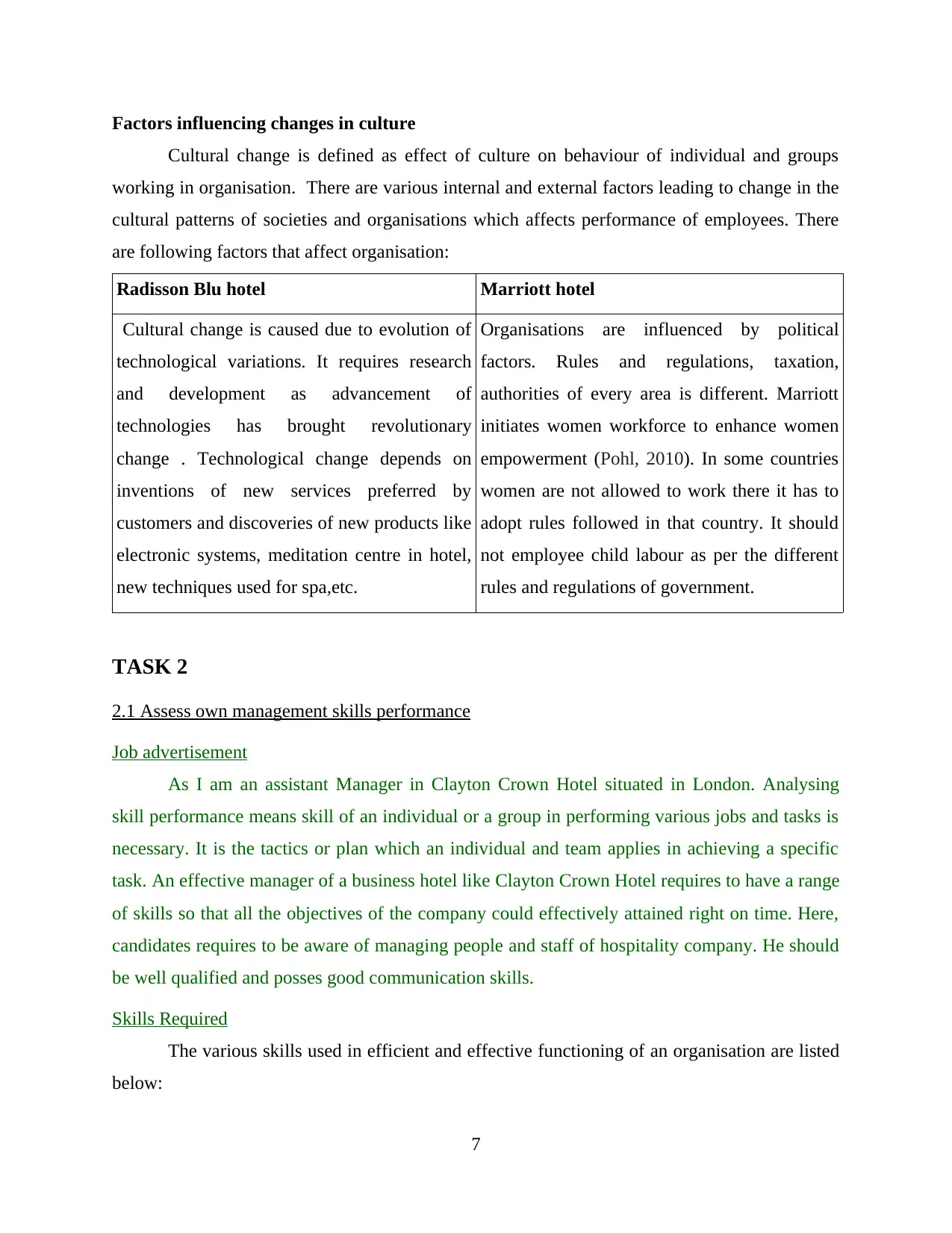
Factors influencing changes in culture
Cultural change is defined as effect of culture on behaviour of individual and groups
working in organisation. There are various internal and external factors leading to change in the
cultural patterns of societies and organisations which affects performance of employees. There
are following factors that affect organisation:
Radisson Blu hotel Marriott hotel
Cultural change is caused due to evolution of
technological variations. It requires research
and development as advancement of
technologies has brought revolutionary
change . Technological change depends on
inventions of new services preferred by
customers and discoveries of new products like
electronic systems, meditation centre in hotel,
new techniques used for spa,etc.
Organisations are influenced by political
factors. Rules and regulations, taxation,
authorities of every area is different. Marriott
initiates women workforce to enhance women
empowerment (Pohl, 2010). In some countries
women are not allowed to work there it has to
adopt rules followed in that country. It should
not employee child labour as per the different
rules and regulations of government.
TASK 2
2.1 Assess own management skills performance
Job advertisement
As I am an assistant Manager in Clayton Crown Hotel situated in London. Analysing
skill performance means skill of an individual or a group in performing various jobs and tasks is
necessary. It is the tactics or plan which an individual and team applies in achieving a specific
task. An effective manager of a business hotel like Clayton Crown Hotel requires to have a range
of skills so that all the objectives of the company could effectively attained right on time. Here,
candidates requires to be aware of managing people and staff of hospitality company. He should
be well qualified and posses good communication skills.
Skills Required
The various skills used in efficient and effective functioning of an organisation are listed
below:
7
Cultural change is defined as effect of culture on behaviour of individual and groups
working in organisation. There are various internal and external factors leading to change in the
cultural patterns of societies and organisations which affects performance of employees. There
are following factors that affect organisation:
Radisson Blu hotel Marriott hotel
Cultural change is caused due to evolution of
technological variations. It requires research
and development as advancement of
technologies has brought revolutionary
change . Technological change depends on
inventions of new services preferred by
customers and discoveries of new products like
electronic systems, meditation centre in hotel,
new techniques used for spa,etc.
Organisations are influenced by political
factors. Rules and regulations, taxation,
authorities of every area is different. Marriott
initiates women workforce to enhance women
empowerment (Pohl, 2010). In some countries
women are not allowed to work there it has to
adopt rules followed in that country. It should
not employee child labour as per the different
rules and regulations of government.
TASK 2
2.1 Assess own management skills performance
Job advertisement
As I am an assistant Manager in Clayton Crown Hotel situated in London. Analysing
skill performance means skill of an individual or a group in performing various jobs and tasks is
necessary. It is the tactics or plan which an individual and team applies in achieving a specific
task. An effective manager of a business hotel like Clayton Crown Hotel requires to have a range
of skills so that all the objectives of the company could effectively attained right on time. Here,
candidates requires to be aware of managing people and staff of hospitality company. He should
be well qualified and posses good communication skills.
Skills Required
The various skills used in efficient and effective functioning of an organisation are listed
below:
7
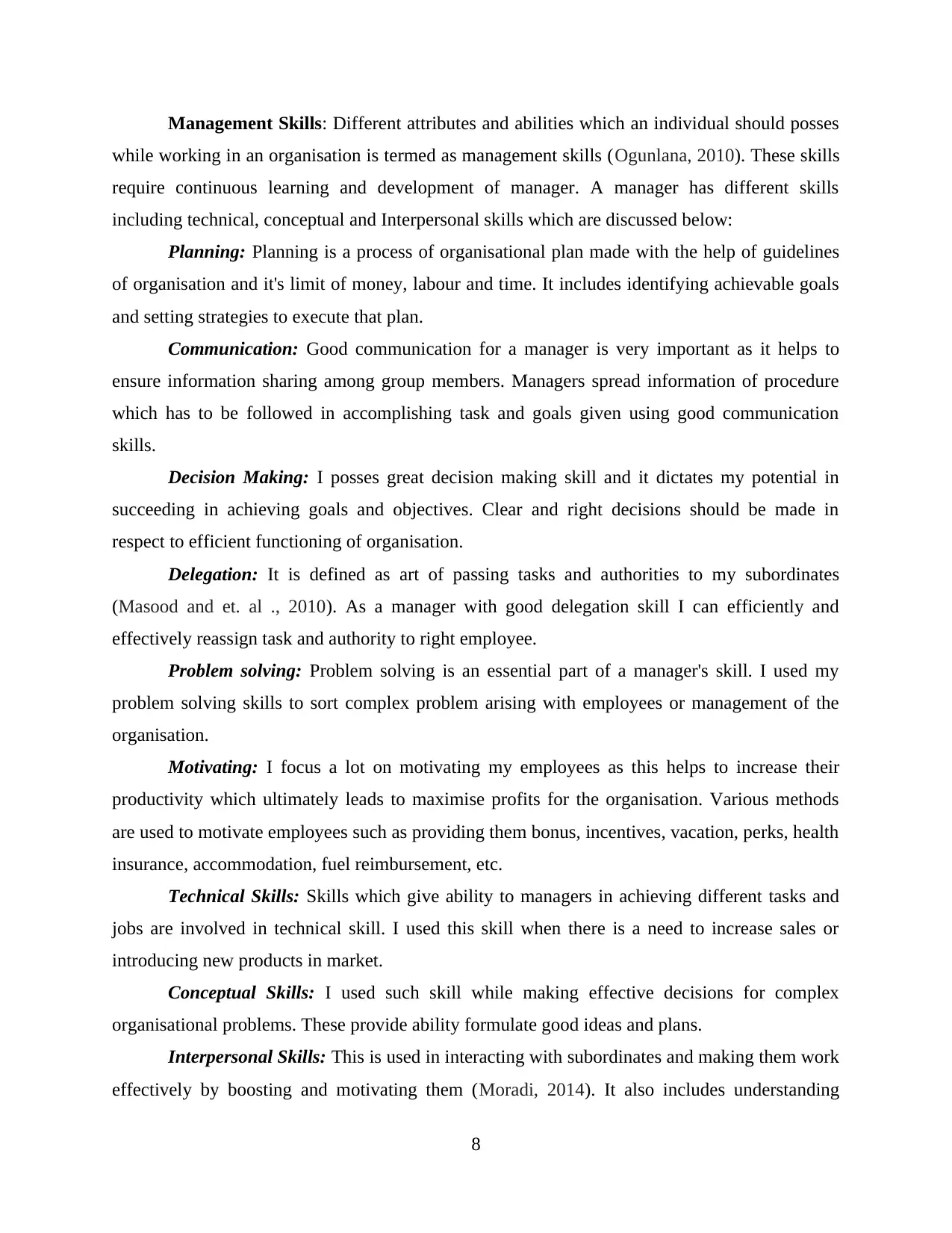
Management Skills: Different attributes and abilities which an individual should posses
while working in an organisation is termed as management skills (Ogunlana, 2010). These skills
require continuous learning and development of manager. A manager has different skills
including technical, conceptual and Interpersonal skills which are discussed below:
Planning: Planning is a process of organisational plan made with the help of guidelines
of organisation and it's limit of money, labour and time. It includes identifying achievable goals
and setting strategies to execute that plan.
Communication: Good communication for a manager is very important as it helps to
ensure information sharing among group members. Managers spread information of procedure
which has to be followed in accomplishing task and goals given using good communication
skills.
Decision Making: I posses great decision making skill and it dictates my potential in
succeeding in achieving goals and objectives. Clear and right decisions should be made in
respect to efficient functioning of organisation.
Delegation: It is defined as art of passing tasks and authorities to my subordinates
(Masood and et. al ., 2010). As a manager with good delegation skill I can efficiently and
effectively reassign task and authority to right employee.
Problem solving: Problem solving is an essential part of a manager's skill. I used my
problem solving skills to sort complex problem arising with employees or management of the
organisation.
Motivating: I focus a lot on motivating my employees as this helps to increase their
productivity which ultimately leads to maximise profits for the organisation. Various methods
are used to motivate employees such as providing them bonus, incentives, vacation, perks, health
insurance, accommodation, fuel reimbursement, etc.
Technical Skills: Skills which give ability to managers in achieving different tasks and
jobs are involved in technical skill. I used this skill when there is a need to increase sales or
introducing new products in market.
Conceptual Skills: I used such skill while making effective decisions for complex
organisational problems. These provide ability formulate good ideas and plans.
Interpersonal Skills: This is used in interacting with subordinates and making them work
effectively by boosting and motivating them (Moradi, 2014). It also includes understanding
8
while working in an organisation is termed as management skills (Ogunlana, 2010). These skills
require continuous learning and development of manager. A manager has different skills
including technical, conceptual and Interpersonal skills which are discussed below:
Planning: Planning is a process of organisational plan made with the help of guidelines
of organisation and it's limit of money, labour and time. It includes identifying achievable goals
and setting strategies to execute that plan.
Communication: Good communication for a manager is very important as it helps to
ensure information sharing among group members. Managers spread information of procedure
which has to be followed in accomplishing task and goals given using good communication
skills.
Decision Making: I posses great decision making skill and it dictates my potential in
succeeding in achieving goals and objectives. Clear and right decisions should be made in
respect to efficient functioning of organisation.
Delegation: It is defined as art of passing tasks and authorities to my subordinates
(Masood and et. al ., 2010). As a manager with good delegation skill I can efficiently and
effectively reassign task and authority to right employee.
Problem solving: Problem solving is an essential part of a manager's skill. I used my
problem solving skills to sort complex problem arising with employees or management of the
organisation.
Motivating: I focus a lot on motivating my employees as this helps to increase their
productivity which ultimately leads to maximise profits for the organisation. Various methods
are used to motivate employees such as providing them bonus, incentives, vacation, perks, health
insurance, accommodation, fuel reimbursement, etc.
Technical Skills: Skills which give ability to managers in achieving different tasks and
jobs are involved in technical skill. I used this skill when there is a need to increase sales or
introducing new products in market.
Conceptual Skills: I used such skill while making effective decisions for complex
organisational problems. These provide ability formulate good ideas and plans.
Interpersonal Skills: This is used in interacting with subordinates and making them work
effectively by boosting and motivating them (Moradi, 2014). It also includes understanding
8
⊘ This is a preview!⊘
Do you want full access?
Subscribe today to unlock all pages.

Trusted by 1+ million students worldwide
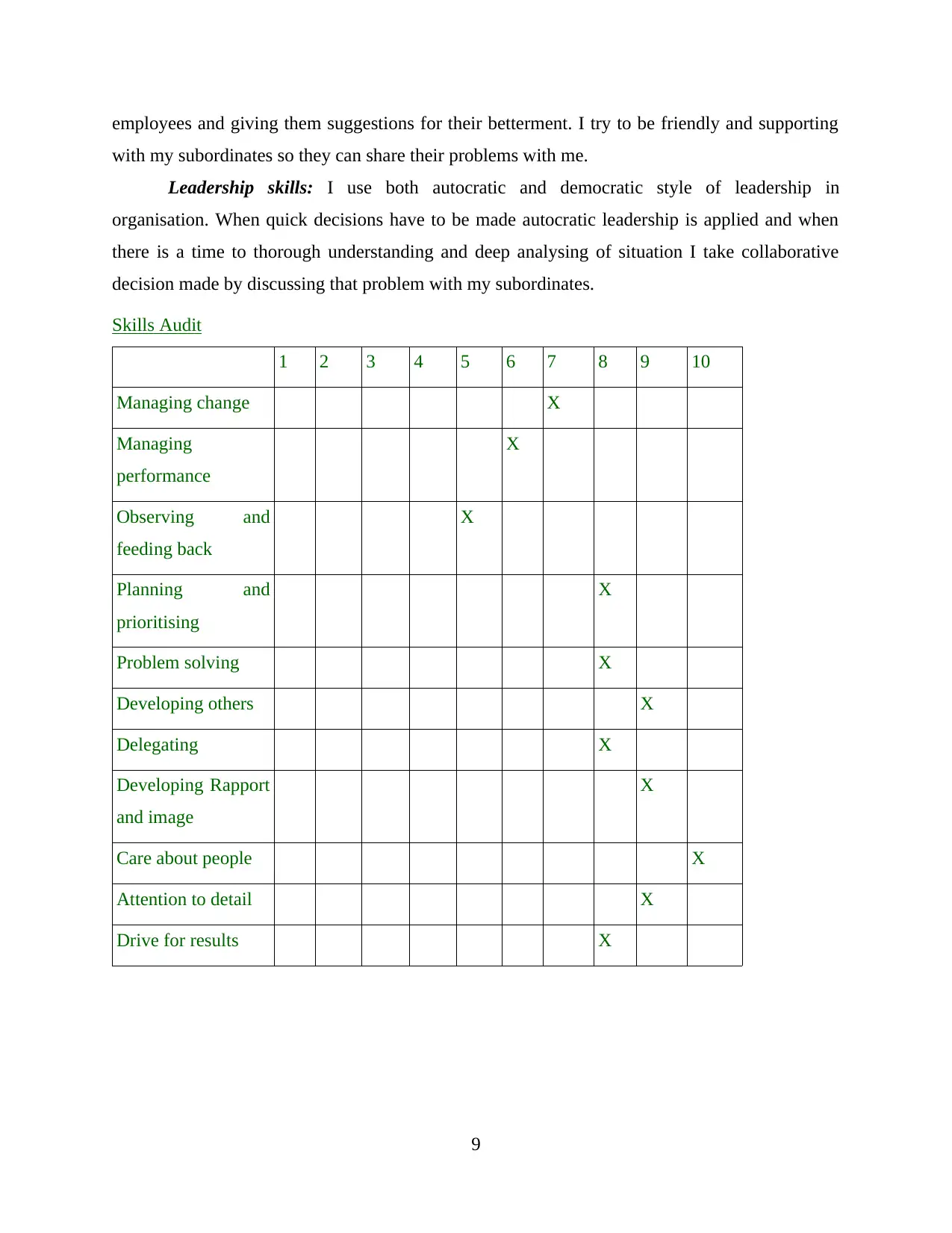
employees and giving them suggestions for their betterment. I try to be friendly and supporting
with my subordinates so they can share their problems with me.
Leadership skills: I use both autocratic and democratic style of leadership in
organisation. When quick decisions have to be made autocratic leadership is applied and when
there is a time to thorough understanding and deep analysing of situation I take collaborative
decision made by discussing that problem with my subordinates.
Skills Audit
1 2 3 4 5 6 7 8 9 10
Managing change X
Managing
performance
X
Observing and
feeding back
X
Planning and
prioritising
X
Problem solving X
Developing others X
Delegating X
Developing Rapport
and image
X
Care about people X
Attention to detail X
Drive for results X
9
with my subordinates so they can share their problems with me.
Leadership skills: I use both autocratic and democratic style of leadership in
organisation. When quick decisions have to be made autocratic leadership is applied and when
there is a time to thorough understanding and deep analysing of situation I take collaborative
decision made by discussing that problem with my subordinates.
Skills Audit
1 2 3 4 5 6 7 8 9 10
Managing change X
Managing
performance
X
Observing and
feeding back
X
Planning and
prioritising
X
Problem solving X
Developing others X
Delegating X
Developing Rapport
and image
X
Care about people X
Attention to detail X
Drive for results X
9
Paraphrase This Document
Need a fresh take? Get an instant paraphrase of this document with our AI Paraphraser
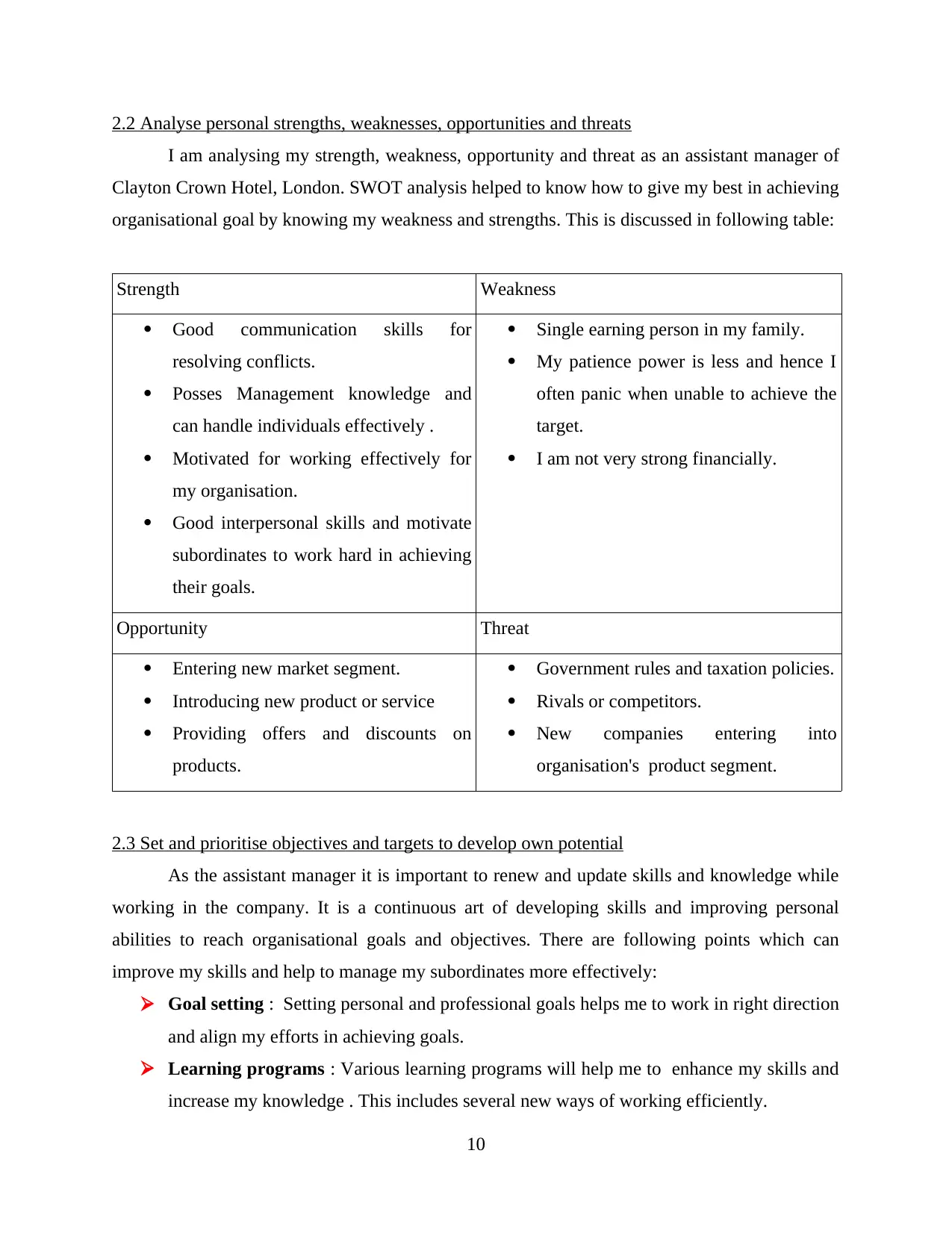
2.2 Analyse personal strengths, weaknesses, opportunities and threats
I am analysing my strength, weakness, opportunity and threat as an assistant manager of
Clayton Crown Hotel, London. SWOT analysis helped to know how to give my best in achieving
organisational goal by knowing my weakness and strengths. This is discussed in following table:
Strength Weakness
Good communication skills for
resolving conflicts.
Posses Management knowledge and
can handle individuals effectively .
Motivated for working effectively for
my organisation.
Good interpersonal skills and motivate
subordinates to work hard in achieving
their goals.
Single earning person in my family.
My patience power is less and hence I
often panic when unable to achieve the
target.
I am not very strong financially.
Opportunity Threat
Entering new market segment.
Introducing new product or service
Providing offers and discounts on
products.
Government rules and taxation policies.
Rivals or competitors.
New companies entering into
organisation's product segment.
2.3 Set and prioritise objectives and targets to develop own potential
As the assistant manager it is important to renew and update skills and knowledge while
working in the company. It is a continuous art of developing skills and improving personal
abilities to reach organisational goals and objectives. There are following points which can
improve my skills and help to manage my subordinates more effectively:
Goal setting : Setting personal and professional goals helps me to work in right direction
and align my efforts in achieving goals.
Learning programs : Various learning programs will help me to enhance my skills and
increase my knowledge . This includes several new ways of working efficiently.
10
I am analysing my strength, weakness, opportunity and threat as an assistant manager of
Clayton Crown Hotel, London. SWOT analysis helped to know how to give my best in achieving
organisational goal by knowing my weakness and strengths. This is discussed in following table:
Strength Weakness
Good communication skills for
resolving conflicts.
Posses Management knowledge and
can handle individuals effectively .
Motivated for working effectively for
my organisation.
Good interpersonal skills and motivate
subordinates to work hard in achieving
their goals.
Single earning person in my family.
My patience power is less and hence I
often panic when unable to achieve the
target.
I am not very strong financially.
Opportunity Threat
Entering new market segment.
Introducing new product or service
Providing offers and discounts on
products.
Government rules and taxation policies.
Rivals or competitors.
New companies entering into
organisation's product segment.
2.3 Set and prioritise objectives and targets to develop own potential
As the assistant manager it is important to renew and update skills and knowledge while
working in the company. It is a continuous art of developing skills and improving personal
abilities to reach organisational goals and objectives. There are following points which can
improve my skills and help to manage my subordinates more effectively:
Goal setting : Setting personal and professional goals helps me to work in right direction
and align my efforts in achieving goals.
Learning programs : Various learning programs will help me to enhance my skills and
increase my knowledge . This includes several new ways of working efficiently.
10
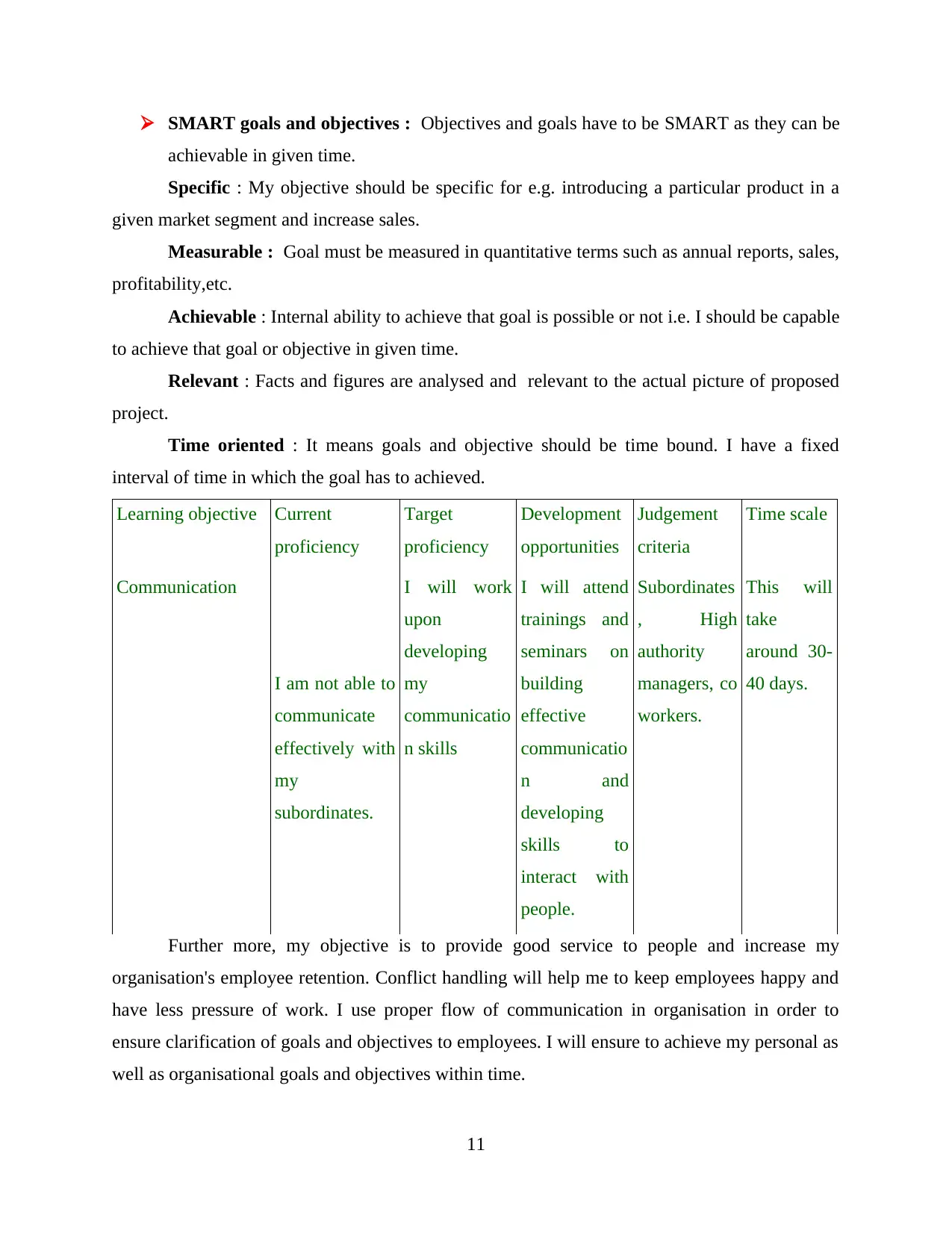
SMART goals and objectives : Objectives and goals have to be SMART as they can be
achievable in given time.
Specific : My objective should be specific for e.g. introducing a particular product in a
given market segment and increase sales.
Measurable : Goal must be measured in quantitative terms such as annual reports, sales,
profitability,etc.
Achievable : Internal ability to achieve that goal is possible or not i.e. I should be capable
to achieve that goal or objective in given time.
Relevant : Facts and figures are analysed and relevant to the actual picture of proposed
project.
Time oriented : It means goals and objective should be time bound. I have a fixed
interval of time in which the goal has to achieved.
Learning objective Current
proficiency
Target
proficiency
Development
opportunities
Judgement
criteria
Time scale
Communication
I am not able to
communicate
effectively with
my
subordinates.
I will work
upon
developing
my
communicatio
n skills
I will attend
trainings and
seminars on
building
effective
communicatio
n and
developing
skills to
interact with
people.
Subordinates
, High
authority
managers, co
workers.
This will
take
around 30-
40 days.
Further more, my objective is to provide good service to people and increase my
organisation's employee retention. Conflict handling will help me to keep employees happy and
have less pressure of work. I use proper flow of communication in organisation in order to
ensure clarification of goals and objectives to employees. I will ensure to achieve my personal as
well as organisational goals and objectives within time.
11
achievable in given time.
Specific : My objective should be specific for e.g. introducing a particular product in a
given market segment and increase sales.
Measurable : Goal must be measured in quantitative terms such as annual reports, sales,
profitability,etc.
Achievable : Internal ability to achieve that goal is possible or not i.e. I should be capable
to achieve that goal or objective in given time.
Relevant : Facts and figures are analysed and relevant to the actual picture of proposed
project.
Time oriented : It means goals and objective should be time bound. I have a fixed
interval of time in which the goal has to achieved.
Learning objective Current
proficiency
Target
proficiency
Development
opportunities
Judgement
criteria
Time scale
Communication
I am not able to
communicate
effectively with
my
subordinates.
I will work
upon
developing
my
communicatio
n skills
I will attend
trainings and
seminars on
building
effective
communicatio
n and
developing
skills to
interact with
people.
Subordinates
, High
authority
managers, co
workers.
This will
take
around 30-
40 days.
Further more, my objective is to provide good service to people and increase my
organisation's employee retention. Conflict handling will help me to keep employees happy and
have less pressure of work. I use proper flow of communication in organisation in order to
ensure clarification of goals and objectives to employees. I will ensure to achieve my personal as
well as organisational goals and objectives within time.
11
⊘ This is a preview!⊘
Do you want full access?
Subscribe today to unlock all pages.

Trusted by 1+ million students worldwide
1 out of 27
Related Documents
Your All-in-One AI-Powered Toolkit for Academic Success.
+13062052269
info@desklib.com
Available 24*7 on WhatsApp / Email
![[object Object]](/_next/static/media/star-bottom.7253800d.svg)
Unlock your academic potential
Copyright © 2020–2026 A2Z Services. All Rights Reserved. Developed and managed by ZUCOL.





